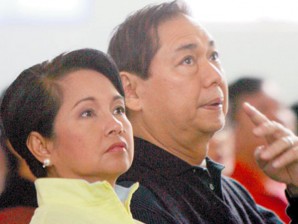It’s not all defeats and losses for the beleaguered former President Gloria Macapagal-Arroyo.
Ombudsman Conchita Carpio-Morales has dismissed the bribery and corruption complaint filed against Arroyo, her husband, Jose Miguel Arroyo, former elections commissioner Virgilio Garcillano and four others for allegedly handing out envelopes with cash and providing transportation, including the use of a helicopter, in Mindanao during the 2004 election campaign.
Also cleared were former Civil Aviation Authority of the Philippines Director General Alfonso Cusi, former Justice Secretary Agnes Devanadera, Philippine Ports Authority manager Efren Ballozos, and former Shariah Circuit Court Judge Nagamura Moner.
The complaint was dismissed because of insufficient evidence, the Office of the Ombudsman said in a statement.
“The complaint contains bare allegations and pieces of evidence that are unsubscribed, unauthenticated and recanted affidavits or statements,” Morales said in the resolution approved last May 25.
The complainants alleged that the Arroyos and the other officials had distributed envelopes containing money to unidentified election officers in Lanao del Norte, Lanao del Sur, Tawi-Tawi, Sultan Kudarat and Cotabato City during the May 2004 polls.
The complainants also said the Arroyos and the other officials had granted 12 multi-cab vehicles to the area and had made a helicopter available for use.
All these were allegedly intended for electoral fraud, they said.
The complaint was filed in August 2011 by Pacasirang Batidor, Ahmare Balt Lucman, Hadji Rashid Limbona and Hadji Abdullah Dalidig.
In dismissing the case, the Ombudsman said the complainants’ allegations could not stand in court. The allegations fail to sustain a well-founded belief that crimes were committed and the accused were probably guilty, Morales said.
She also found the bribery allegations to be insufficient because the recipients of the money were not identified or named as public officers.
“In bribery, it is essential that the recipient of the bribe is a public officer. Hence before a prosecutor can declare that there is probable cause for said felony, there should be proof or showing that the recipient is indeed a public officer,” she said.
Originally posted at 05:31 pm | Wednesday, June 06, 2012
